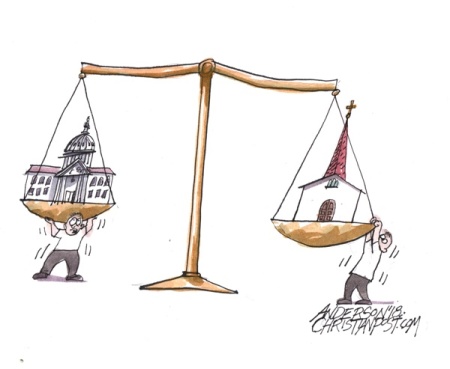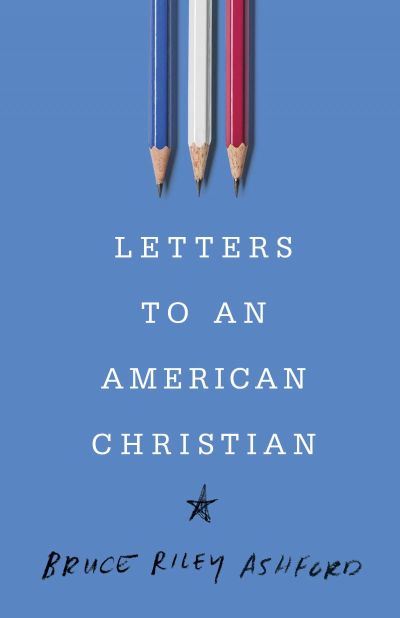'Letters to an American Christian' author: What does the Gospel have to do with politics?

As Christians struggle with how best to apply their faith to these turbulent political times, theologian Bruce Riley Ashford has written a book to offer guidance.
Letters to an American Christian, published June 1 by B&H Books, contains 26 short chapters, written as letters to "Christian," an archetype new to the faith college student struggling with what his transformation has to do with politics.
"The purpose of political engagement is to persuade our fellow citizens and elected representatives toward the best view of justice and toward the best policies. Of course the Bible has something to say about these things!" Ashford, provost/dean of the faculty and professor of theology and culture at Southeastern Baptist Theological Seminary, tells Christian in chapter 2, "The Good of Politics."
The Bible contains four "acts," Ashford continues, creation, fall, redemption and consumation. And each of those acts relate to politics.

The middle chapters each deal with separate "hot-button" issues, such as abortion, racism, gun control, gay marriage, "fake news," environmentalism, transgenderism, nationalism and war. While this list sounds like a recipe for getting disinvited from your next family reunion, Ashford demonstrates how to navigate those land mines with an eye toward the Gospel.
In a July 26 interview with The Christian Post, Ashford said, "When I write articles against abortion, euthanasia, or physician-assisted suicide, most conservatives are in favor. But when I write articles encouraging us to weed out racism in its individual and institutional forms, or to treat undocumented immigrants with both justice and mercy, some conservatives dismiss me as 'liberal' or a 'cultural Marxist.'"
In chapter 25, Ashford writes about his "up-and-down relationship with American conservatism," which he views as currently in a state of disrepair. To have a positive influence on public policy, he writes, conservatives must "draw upon our better angels by casting aside the temptation to misrepresent, mock, condescend to, or otherwise belittle progressives and progressive views."
"Our ideological opponents are not enemies to be destroyed. They are peers to be persuaded," he adds.
Here is the full interview, conducted via email:
CP: Why did you write this book?
Ashford: During the past several decades, Christians who are conservative theologically and politically have felt the ground moving beneath us. Theologically, we've watched as an increasing number of our neighbors have begun to consider historic Christianity—especially its views about human nature, gender, and sexuality—implausible, backwards, and even bigoted. Politically, we've seen the main political divide in our country shift from "conservative vs. liberal" to "open country vs. closed country." In light of these and other developments, I wanted to write a book for everyday American Christians who want their Christian faith to help them shape their response to our ever-changing social, cultural, and political context.
CP: Talk about your target audience. The title is a big giveaway, but besides "American Christian," I imagine these letters going to a young, white, new to the faith, politically conservative, evangelical Christian. Am I wrong? Was there a specific person you had in mind?

Ashford: In the past, I've written all of my books for seminary people, pastors, and grad students. This book is different. I wrote it for everyday American Christians, the kind of people I write for in my role as a Fox News Opinion Contributor. I want American conservatism to be its best self rather than a perverted and pale image of its best self.
To use an aquatic analogy, I'm worried that there are twin "undertows" threatening to pull American conservatives under.
On the left, there are currents that undermine human dignity (e.g. abortion-on-demand), redraw the lines of nature (e.g. transgender ideology), conceive of public life in terms of tribal warfare (e.g. identity politics), restrict religious liberty (e.g. accusations of "bigotry" toward conscientious objectors), drag the nation's economy down (e.g. socialism), and foster uncivil public discourse.
On the right, there are currents that would restrict religious liberty (by effectively limiting its exercise to Jews and Christians) and foster uncivil discourse. In the fever swamps of the far right, there are also currents that undermine human dignity and provide cover for white racism (e.g. the ethnonationalism of the alt-right) and conceive of politics in terms of tribal warfare (e.g. white identity politics and white nationalism).
I want to help conservatism be its best self by avoiding these and other temptations.
CP: Many American Christians seem to struggle with "doing politics" well, either because they're uninvolved or deeply partisan, mixing their Christian faith with political parties, nationalism, or political ideologies. You argue that the Church is non-political in the partisan sense but deeply political in the "Christ is King" sense. Explain that.
Ashford: Yes, the gathering of a local church is deeply political in one sense of the word, and not-so-political in another sense. On the one hand, it is deeply political in the sense that every week, we gather around Word and Table to declare that Jesus is Lord and Caesar is not. In this sense, the local church nourishes our primary political identity—ambassadors of the King. It reminds us that our other political allegiances and affiliations are tentative in light of our allegiance to Christ the King. It is also deeply political in the sense that it shapes its member's thoughts and affections, thus shaping their Monday-through-Saturday engagement in politics and public life.
But on the other hand, in another sense the local church is not so political. Pastors and local congregations should not act like public policy think tanks or Super PACS. They are neither called nor competent to adjudicate, for example, the finer points of their town's sewage referendum or the nuances of the nation's free market economy.
CP: In the American context, in what sense would a proper Gospel witness in the political sphere be considered conservative? Liberal?
Ashford: Let me recouch this big question by offering a perspective on one hot-button issue — human dignity. Often, I write opinion pieces that are underlain by Christian teaching about human dignity, arguing that we must ascribe inherent worth and value to human beings, secure the right for people to shape their lives according to their deepest religious convictions, and use our strength to protect people who are the weakest and most vulnerable. How do conservatives react to my opinion pieces on those topics? When I write articles against abortion, euthanasia, or physician-assisted suicide, most conservatives are in favor. But when I write articles encouraging us to weed out racism in its individual and institutional forms, or to treat undocumented immigrants with both justice and mercy, some conservatives dismiss me as "liberal" or a "cultural Marxist."
CP: You identify as a political conservative (with concerns about the current state of American conservatism and the GOP). What do you think about your liberal Christian friends? Can you be a liberal and a Democrat while maintaining a positive Christian witness in politics, or are they too misguided?
Ashford: I do have friends who are registered Democrats, some of whom are pro-life Democrats. And while I could not maintain a membership in the Democratic party, I am grateful that these friends are trying to make the American left its better self.
CP: You don't say much about our president, but I feel like his presence is throughout the book. How much of the book was inspired by the current struggles Christians have with how to relate to President Trump?
Ashford: In 2015, just before Trump's emergence, I co-authored a book entitled One Nation under God. It sold very well and seemed to resonate with many conservatives in 2015. But Trump's emergence in 2016 represented a frontal assault on the influential "Reagan-Buckley" coalition and a drastic reshaping of the national political conversation. It also quickly divided conservatives among ourselves, to the effect that any affirmation of Trump turns off the ears of many Never Trumpers, while any criticism of Trump shuts down conversation with many Pro Trumpers. Thus, in Letters to an American Christian, I speak to the issues without speaking about Trump directly.





















